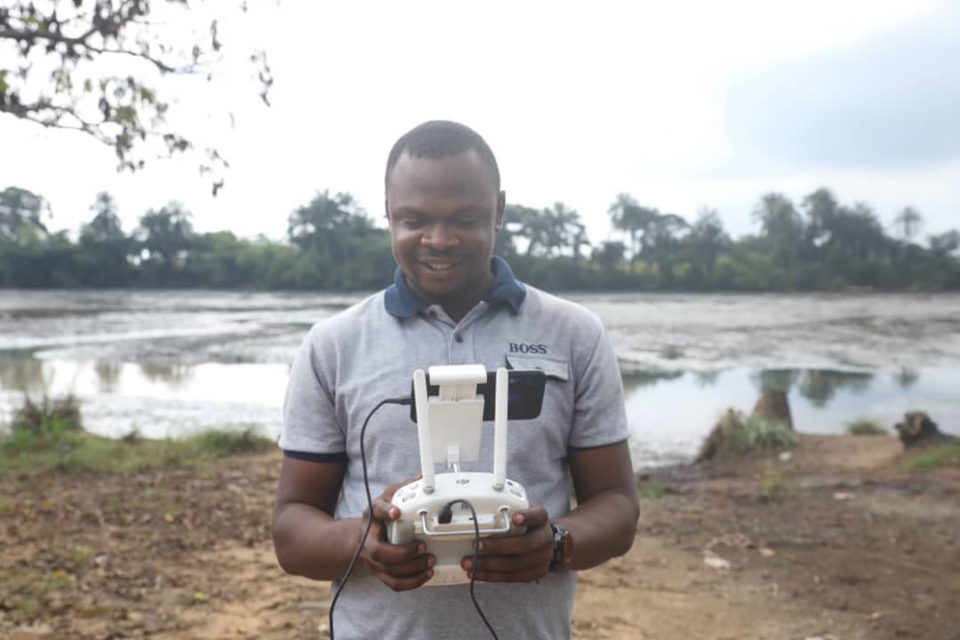Earlier this year, two journalists from Nigeria, Kelechukwu Iruoma and Ruth Olurounbi, teamed up to explore and document the impact of oil contamination on communities in the Niger Delta where millions of barrels of oil had spilled decades ago.
Their investigation revealed that oil spills in the region of Ogoniland, home to more than 850,000 people, continued to have negative and dangerous health effects on the Ogoni people, some of the oldest settlers in the area who rely on farming and fishing for their livelihoods.
Today, their work has led to a commitment by government to provide safe drinking water to the townships affected by oil contamination – which studies have previously linked to cancer, childhood malnutrition and low fertility – resulting in the poisoning of their water.
The journalists visited four communities where wells were contaminated with benzene, a known carcinogen at levels over 900 times above the World Health Organization (WHO) guideline. They engaged local leaders to enlist 50 non-smoking, non-alcohol-drinking residents to give blood samples, which the reporters brought to a lab in Lagos for evaluation. Lab testing conducted by health professionals working with Iruoma and Olurounbi reported that more than half of the residents who gave blood samples had dangerously high levels of an enzyme that is a marker for liver damage.
While the land and water vital to the support systems of those who live there are contaminated by the oil spills, moving elsewhere is not an option for many. “In our culture, land is very important to us. And, if you are left a piece of land […] you are left something very dear. You are left a legacy and you don’t move away from that,” says Olurounbi. “But every year harvesting there is less and less to harvest because the land will not reproduce.”
This is why restoration of the area is crucial to the lives of those who call Ogoniland home. However, government’s promise to hire contractors to provide potable water has come nearly a decade after a United Nations Environment Programme (UNEP) report called on the Nigerian government and oil companies to share the cost of extensive restoration of the area.
“The speed of the clean-up has been so slow that the desired results will not be achieved,” an environmental scientist and Ogoniland resident told Iruoma and Olurounbi. “This is what the people have been living with all through their lives. This is suicide.”
Restoration is vital to supporting the betterment of public health in the region which has been devastated by multiple oil spills.
In their investigation, the two journalists leveraged technologies such as drones to show the extent of environmental wreckage in the area, and interviewed residents, leaders and local scientists. Olurounbi and Iruoma received an ICFJ Alumni Reporting Grant which included $7,500 plus hands-on training in using drones, capturing still and video photography of the contaminated areas, and creating infographics. The funds from the grant were used to pay for the blood tests and travel to the region.
“We have pictures and videos that show the contaminated soil and rivers. Rivers where people fish or where they go to take water, even now,” Iruoma says. “We used the drone photos and video to show clearly how the oil spill affected the livelihood of the people.”
Backed by Microsoft’s News Labs, the grants were created to support data journalism and immersive storytelling in ways that promote transparency and understanding.
Applications were open to alumni of previous ICFJ programs. Iruoma participated in ICFJ’s Reporting Fellowship on Migration and Climate for Nigerian Journalists in 2017. Olurounbi is a member of the Nigerian chapter of WanaData, a network of female journalists developed by ICFJ and Code for Africa that is driving digital storytelling across the continent.
This story has been shortlisted in the Excellence in Environmental Journalism category of the Fetisov Journalism awards, the most lucrative journalism awards in history. The winning list will be selected by December 1, 2020.





